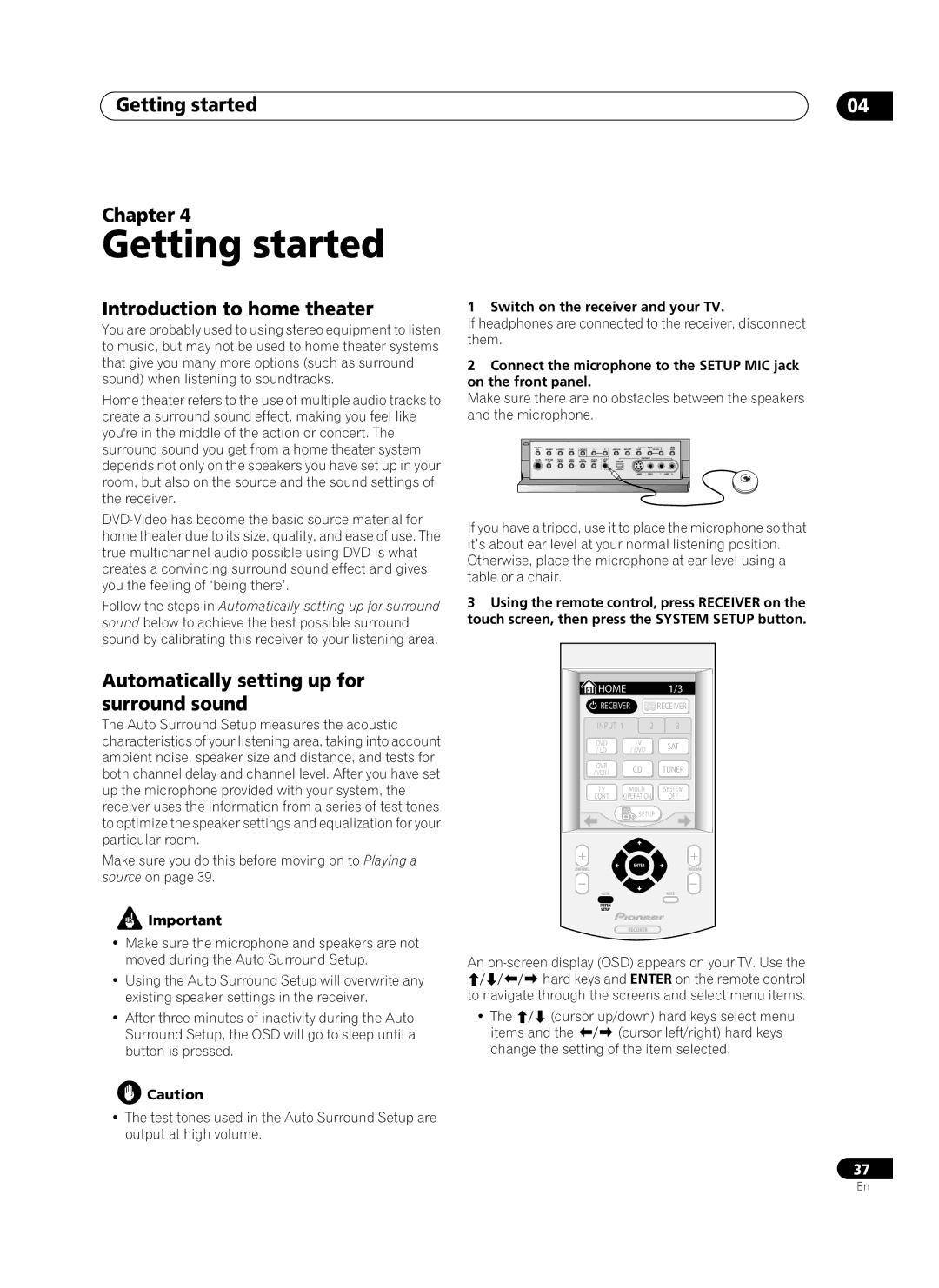
Getting started
Chapter 4
Getting started
Introduction to home theater
You are probably used to using stereo equipment to listen to music, but may not be used to home theater systems that give you many more options (such as surround sound) when listening to soundtracks.
Home theater refers to the use of multiple audio tracks to create a surround sound effect, making you feel like you're in the middle of the action or concert. The surround sound you get from a home theater system depends not only on the speakers you have set up in your room, but also on the source and the sound settings of the receiver.
Follow the steps in Automatically setting up for surround sound below to achieve the best possible surround sound by calibrating this receiver to your listening area.
Automatically setting up for surround sound
The Auto Surround Setup measures the acoustic characteristics of your listening area, taking into account ambient noise, speaker size and distance, and tests for both channel delay and channel level. After you have set up the microphone provided with your system, the receiver uses the information from a series of test tones to optimize the speaker settings and equalization for your particular room.
Make sure you do this before moving on to Playing a source on page 39.
![]() Important
Important
•Make sure the microphone and speakers are not moved during the Auto Surround Setup.
•Using the Auto Surround Setup will overwrite any existing speaker settings in the receiver.
•After three minutes of inactivity during the Auto Surround Setup, the OSD will go to sleep until a button is pressed.
![]() Caution
Caution
•The test tones used in the Auto Surround Setup are output at high volume.
04
1 Switch on the receiver and your TV.
If headphones are connected to the receiver, disconnect them.
2Connect the microphone to the SETUP MIC jack on the front panel.
Make sure there are no obstacles between the speakers and the microphone.
|
|
|
|
|
|
|
|
|
| TUNER |
|
| SBCH |
| MIDNIGHT | LOUDNESS | TONE | OPTION |
|
| DIGITALNR | INPUT ATT | CLASS | STATION |
|
| MODE |
PHONES | SPSYSTEM | SIGNAL | VIDEO | TAPE2 | STREAM | SETUP |
|
| VIDEOINPUT |
|
|
| |
|
|
|
|
|
|
| |||||||
| A/B | SELECT | SELECT | MONITOR | DIRECT | MIC | DIGITALIN |
|
|
|
|
|
|
|
|
|
|
|
|
|
|
| VIDEO | L | AUDIO | R | |
If you have a tripod, use it to place the microphone so that it’s about ear level at your normal listening position. Otherwise, place the microphone at ear level using a table or a chair.
3Using the remote control, press RECEIVER on the touch screen, then press the SYSTEM SETUP button.
![]() HOME 1/3
HOME 1/3
 RECEIVER
RECEIVER  RECEIVER
RECEIVER
INPUT 1 | 2 | 3 | |
DVD | TV | SAT | |
/ LD | / DVD | ||
| |||
DVR | CD | TUNER | |
/ VCR1 | |||
|
| ||
TV | MULTI | SYSTEM | |
CONT | OPERATION | OFF | |
| SETUP |
| |
CHANNEL | ENTER | VOLUME | |
| |||
MENU |
| MUTE | |
SYSTEM |
|
| |
SETUP |
|
| |
| RECEIVER |
|
An
• The | (cursor up/down) hard keys select menu | |
items and the | (cursor left/right) hard keys | |
change the setting of the item selected.
37
En
